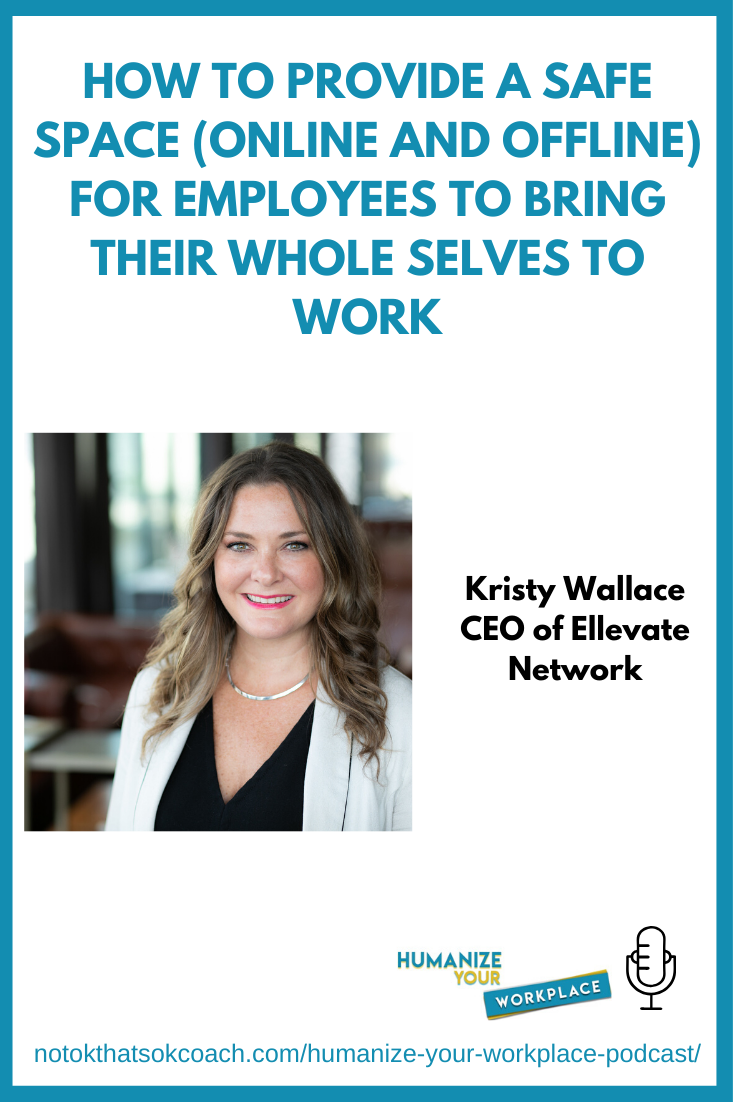In this episode of Humanize Your Workplace, we chat with Kristy Wallace. She is the CEO of Ellevate Network and is responsible for executing Ellevate Network’s mission to close the gender achievement gap in business by providing professional women with a global community to lean on and learn from. She directs the Network’s staff, is responsible for business growth and strategy, and works closely with Ellevate’s Chapter Leaders, Business Partners, and Champions to further Ellevate’s impact.Kristy is a regular speaker and thought leader on Leadership, Diversity, Social Entrepreneurship, Networking, and Entrepreneurialism.
Kristy is also the host of the Ellevate Podcast, Conversations with Women Changing the Face of Business. Most recently, Kristy was recognized as a Woman of Influence by the New York Business Journal.Kristy strives to support women and girls in achieving their dreams. She is an Angel Investor with Pipeline Angels, and organization creating capital for women and non-binary femme social entrepreneurs; a Member of the UN Women Global Innovation Coalition for Change; an Advisor for the 92Y Women in Power Fellowship for Rising Female Leaders; on the Advisory Council for the Villanova University Innovation, Creativity, and Entrepreneurship Institute; Co-Chair of the Leadership Advisory Board for the Girl Scouts of Greater NYC; and a Board Member at Workforce Professionals Training Institute.
Prior to joining Ellevate, Kristy was a founding team member of Zeel.com, where she oversaw operations, business modeling, brand development, partnerships, and fundraising. Prior to Zeel, Kristy served as VP of North America Ad Sales and then GM of International Operations at Vault.com.Kristy obtained her BA in English/Sociology from Villanova University. Kristy lives in Brooklyn, NY with her husband and three wonderful children.
We cover:
* embracing networking and finding ways to connect with people (in and outside of your organization)
* making a commitment to bring your whole self to work
* providing a safe space (online and in person) for employees to share topics that are important to them
To follow Ellevate on social media:Instagram: @Ellevate_Ntwk Twitter: @EllevateNtwk
To listen to this week’s episode, head over to Google Podcasts, Spotify, Apple Podcasts, or Stitcher, check it out below.
Do you find the term “networking” to be cliché?
It’s tricky. Networking is a word you’ve heard of and you understand what it means as a community. But I have heard that networking makes people feel very dirty or it feels transactional, salesy, lacking authenticity and deepening of relationships.
In a digital age, networking means web connections and being on the network. I’m on a mission to find the next word. It’s about how we build relationships. But I think relationships tends to make you think about your friends or your family which is a deeper and personal relationship. So, there must be this middle ground of it’s not transactional business and it’s not a relative or someone you’ve known all your life. What is that space in between where you build authentic connections with those who help you professionally, personally and vice versa?
How can we get to know someone at a professional event without just talking about what we do for a living?
I think it’s interesting when you’re at an event and someone is introducing a person and it’s: their name, title, where they worked and the awards they’ve received. It’s a resume and that’s still very one-dimensional.
But if they shifted the conversation to talk about what drives that passion or how their drive impacts the things, they care about every single day it could be getting at the exact same information. But you’re coming at it from a different direction. This is how you humanize that person and talk about what makes them unique versus this one-dimensional listing of accomplishments and their titles.
Can you tell us about the “community hours” at Ellevate and how it’s helped your employees to get closer with one another?
I thank you for this question I love answering it. I also have a podcast, the Ellevate Podcast, and I spoke with a woman from Accenture, Nellie Borrero. I really appreciate Nellie. She is such an advocate for women in the workplace around mental health and creating work spaces that cultivate and support the entire person and recognize the things we bring into the workplace with us that may be unseen or don’t apply directly to our day-to-day jobs.
She mentioned that Accenture has town halls around things that are happening in the world outside of the workplace that may be impacting those in the workplace, using it as a time to bring conversation and awareness into that space. And it really resonated with me and so it’s something that I wanted to make a reality at Ellevate.
My team is close-knit, but they’re incredibly diverse. They are faced with things that are happening in this world and they affect them differently. They face different challenges; they have different perspectives and they don’t always recognize the impact of our world on people outside of these events.
There’s someone on our team who’s passionate about the environment and it was bothering her that people would bring plastic silverware from the deli or plastic containers and use hand soap from plastic bottles. And so, she started making changes, but people didn’t understand why this mattered to her and why she was making these changes in the workplace.
Long story short we started once a month community hours to talk about these topics. It’s a safe space for anyone in the company to come together and to talk about what’s on their mind. And there’s no set agenda, there’s no judgement. There’s the understanding that our organization has values and guiding principles and we don’t just put it out there for publicity or show. We really internalize them, and we believe in them and we address them on a regular basis with our team. And living our values internally with each other with our customers with our broader community. Community hours have become this safe space for those on our team to talk about what they’re facing and what’s keeping them up at night or what’s impacting them.
Beyond that when we use Slack as a communication tool within our company. We have channels that are specific to mental health to talk about things that triggered them that day or a way that they’re feeling. But you realize in all of these situations that you have to learn the etiquette and make that effective within your organization. For example in the Slack channel if someone’s going to post something they first say “trigger warning” and then they post it in the comments so it’s not just popping up in someone’s feed and then they see something that could affect them or be disturbing to them. It’s giving people the space to also consume that information if they want it on their own time when it’s appropriate for them.
It’s recognizing that we’re not robots. It’s not like we just come into the workplace and all I’m thinking about is work and then I go home and I’m a human again. I can feel things and I can be impacted by things. We know that we each bring in different perspectives and different feelings and experiences into the workplace. And if we can provide a place in an environment for those conversations to be had in a safe space it is not only provides more inclusion within our company, but it’s also providing deeper connection amongst people that work together all day every day.
If a company is looking to start “community hours,” how can they get started?
Just start somewhere and pick a topic. We know that many people in the organization are passionate about the environment and the climate strike. If you want to be part of a conversation about this and if you’re interested in learning more about ways that we can take different actions, come to this room for a meeting. It’s an open, non-mandatory invitation.
I think that there’s some topics that are more triggering to people than others. Certainly, violence, discrimination, racism, and harassment are important topics to talk about but are understandably very emotional and triggering to many people. So, it might be the first step to talk about something you feel. Those conversations take building trust within your community and just start with just one event, one topic, and open conversation.
I think that there’s differing debates about if leadership should be there or not. Some think that if the leaders are there it isn’t a safe space anymore because that leader doesn’t have a strong relationship with the team. For us, the head of operations is there but she’s there because she’s deeply invested in this community, being an ally and in being a champion for them so they trust. But also having a leader there shows that it is important and that it is a commitment that they’re making around some of these issues.
In our case we don’t have a set agenda, it’s just come in the room and talk about what’s on your mind. But depending on the culture of your organization, it may or may not work the first few times. People have to be comfortable being in an environment and speaking up and knowing that there’s no judgement and no ramifications for that.
- Cultivating Relationships - July 20, 2021
- Empowering Our People - July 13, 2021
- Finding Purpose - July 6, 2021




